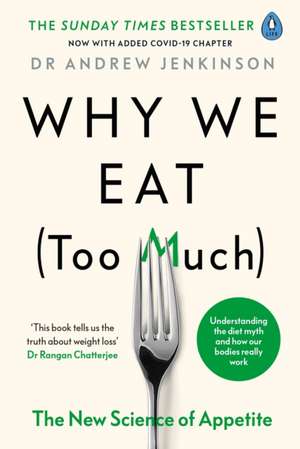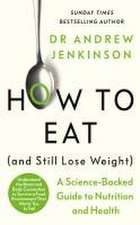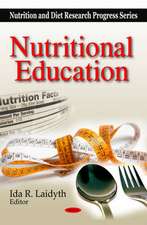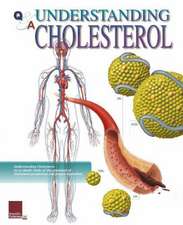Why We Eat (Too Much): The New Science of Appetite
Autor Dr Andrew Jenkinsonen Limba Engleză Paperback – 13 ian 2021
'A compelling look at the science of appetite and metabolism'Vogue
'This book tells us the truth about weight loss' Dr Rangan Chatterjee
_______________
We've all heard the golden rule: eat less, exercise more and you'll lose weight. But what if it isn't that simple?
For over two decades, weight loss surgeon Dr Andrew Jenkinson has treated thousands of people who have become trapped in the endless cycle of dieting.Why We Eat (Too Much), combines case studies from his practice and the new science of metabolism to illuminate how our appetite really works.
Debunking myths of about body and systematically explaining why dieting is counter-productive, this unflinching book investigates every aspect of nutrition: from the'set weight point'that is unique to all of us, togood and bad fats, and fromhow genes impact our weighttohow our hormones are affected after a diet ends.
With a new chapter about the link between obesity and COVID-19, this incredible book will help you understand your body better than ever before.
_______________
'Articulate, clear, a joy to read, this is a book that really needed written' Joanna Blythman, author ofSwallow This
'Highly persuasive . . . a radical approach to weight loss'Sunday Times
'Debunks the myths around dieting and weight-loss'Telegraph
Preț: 55.90 lei
Preț vechi: 69.98 lei
-20% Nou
Puncte Express: 84
Preț estimativ în valută:
10.70€ • 11.17$ • 8.85£
10.70€ • 11.17$ • 8.85£
Carte disponibilă
Livrare economică 14-26 martie
Livrare express 27 februarie-05 martie pentru 30.51 lei
Preluare comenzi: 021 569.72.76
Specificații
ISBN-13: 9780241400531
ISBN-10: 0241400538
Pagini: 352
Dimensiuni: 129 x 198 x 21 mm
Greutate: 0.25 kg
Editura: Penguin Books
Colecția Penguin Life
Locul publicării:London, United Kingdom
ISBN-10: 0241400538
Pagini: 352
Dimensiuni: 129 x 198 x 21 mm
Greutate: 0.25 kg
Editura: Penguin Books
Colecția Penguin Life
Locul publicării:London, United Kingdom
Notă biografică
Dr
Andrew
Jenkinsonis
a
consultant
surgeon
with
a
special
interest
in
advanced
laparoscopic,
or
keyhole
surgery.
He
is
part
of
an
expert
team
developing
advances
in
gastrointestinal
(stomach
and
bowel)
surgery
at
University
College
Hospital
in
Bloomsbury,
central
London.
Recenzii
Fascinating
science
...
One
of
Britain'stop
weight
loss
experts
Cool, clear and highly persuasive... a radical approach to weight loss
I would recommend [it] to anyone trying to lose weight. I would also recommend [it] to those who struggle to be kind to people with obesity
Acompelling lookat the science of appetite and metabolism
Debunks the myths around dieting and weight-loss
Arefreshing antidoteto junk public health diet advice. The current epidemic of obesity and diet-related disease is a legacy of catastrophic public health advice based on flimsy science. Dr Jenkinson takes-down this failed paradigm and replaces it withsensible, workable advicethat reflects the sanity of new-wave nutrition thinking. Articulate, clear, a joy to read,this is a book that really needed written
Will engross anyonewho has ever struggled with dieting, but you don't have to want to lose weight to read it ... If you do this then2020 might be the year that you learn to understand your body
Dr Jenkinson wants solutions because he knows how recent and overwhelming the global weight problem is ...His key insightis that weight isn't chosen by our conscious mind. Our bodies are designed to keep our weight at a set point ... His message is for individuals wanting help, not industry or government, who may block their ears.It's one of enjoyment, not deprivation, summed up by "eat more, rest more" ...He promises no incredible solutions, no drastic fat loss, no scourging or short-term January misery, just a gradual improvement in metabolic health, weight and wellbeing over months and years.I hope he's listened to
Distilling what he has learned over decades of practice[...] in his book, Mr Jenkinson says a far better approach is toditch the quick-fix solutionin favour of an old-fashioned approach'
Cool, clear and highly persuasive... a radical approach to weight loss
I would recommend [it] to anyone trying to lose weight. I would also recommend [it] to those who struggle to be kind to people with obesity
Acompelling lookat the science of appetite and metabolism
Debunks the myths around dieting and weight-loss
Arefreshing antidoteto junk public health diet advice. The current epidemic of obesity and diet-related disease is a legacy of catastrophic public health advice based on flimsy science. Dr Jenkinson takes-down this failed paradigm and replaces it withsensible, workable advicethat reflects the sanity of new-wave nutrition thinking. Articulate, clear, a joy to read,this is a book that really needed written
Will engross anyonewho has ever struggled with dieting, but you don't have to want to lose weight to read it ... If you do this then2020 might be the year that you learn to understand your body
Dr Jenkinson wants solutions because he knows how recent and overwhelming the global weight problem is ...His key insightis that weight isn't chosen by our conscious mind. Our bodies are designed to keep our weight at a set point ... His message is for individuals wanting help, not industry or government, who may block their ears.It's one of enjoyment, not deprivation, summed up by "eat more, rest more" ...He promises no incredible solutions, no drastic fat loss, no scourging or short-term January misery, just a gradual improvement in metabolic health, weight and wellbeing over months and years.I hope he's listened to
Distilling what he has learned over decades of practice[...] in his book, Mr Jenkinson says a far better approach is toditch the quick-fix solutionin favour of an old-fashioned approach'




















